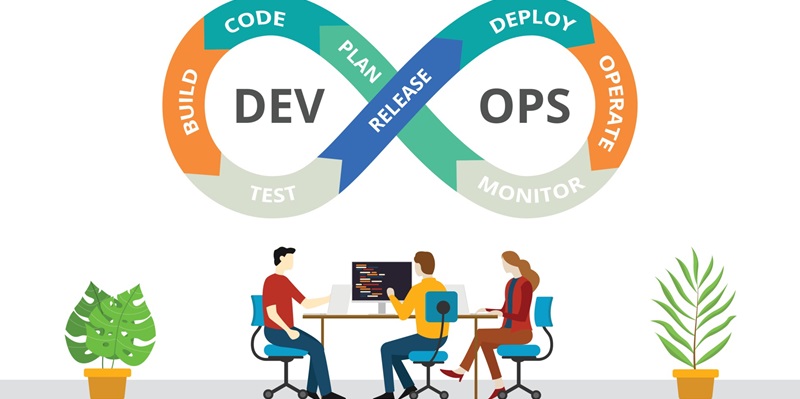In today’s rapidly evolving technological landscape, mastering DevOps has become crucial for organizations seeking to streamline software development and deployment processes. DevOps, an amalgamation of development and operations, emphasizes collaboration, automation, and efficiency. This article will provide a comprehensive guide to understanding and mastering the various components of DevOps, from cultural aspects to technical skills.
Cultural components of DevOps
The success of DevOps lies in fostering a cultural shift within organizations. The collaborative and agile mindset at the core of DevOps promotes communication, cross-functional cooperation, and shared responsibilities. Teams must work closely together, breaking down silos and embracing continuous learning and feedback loops to deliver high-quality software at a faster pace.
Foundational knowledge of scripting
While DevOps professionals do not need to be expert coders, possessing a foundational understanding of scripting languages is critical. Scripting languages, such as Bash, PowerShell, and Python, allow for automation of repetitive tasks and the creation of efficient workflows. Proficiency in scripting enables practitioners to leverage automation tools effectively and drive significant productivity gains.
Automation Tools
Automation lies at the heart of DevOps, enabling teams to accelerate development and deployment cycles. Popular automation tools like Jenkins, Kubernetes, and Ansible automate tasks such as building, testing, and deploying applications. Jenkins, a powerful continuous integration and continuous delivery (CI/CD) tool, helps automate the software release process. Kubernetes, a container orchestration platform, simplifies the management of containerized applications. Ansible automates infrastructure provisioning, configuration management, and application deployment. Mastering these tools empowers teams to achieve faster and error-free software delivery.
Version Control Systems
Version Control Systems, with Git being the most widely adopted, play a vital role in tracking modifications to the codebase, facilitating collaboration, and enhancing coding efficiency. Git allows multiple developers to work simultaneously, merging their changes easily, and reverting to previous versions if necessary. Understanding the fundamentals of Git is essential for efficient code management and seamless collaboration.
Understanding Linux Fundamentals
A significant portion of the DevOps toolset runs on Linux. Therefore, having a strong foundation in Linux fundamentals is crucial. Understanding concepts such as file systems, permission management, and shell scripting aids in effectively utilizing DevOps tools, troubleshooting issues, and managing server environments.
Mastering the CI/CD Process
The CI/CD process is a cornerstone of DevOps, automating the integration, testing, and delivery of software. Adopting CI/CD practices reduces friction in collaboration, improves software quality, and accelerates time-to-market. By mastering CI/CD tools such as Jenkins, GitLab CI, or Azure DevOps, teams can build, test, and deploy applications continuously, ensuring the quick delivery of new features and bug fixes.
Infrastructure Management
Efficient infrastructure management is crucial for successful DevOps implementations. Infrastructure as Code (IaC) tools like Terraform and AWS CloudFormation allow for the declarative configuration of infrastructure resources, enabling teams to provision, manage, and update infrastructure efficiently. By utilizing IaC tools, organizations gain scalability, consistency, and rapid adaptability in dynamically changing environments.
Real-Time Monitoring and Log Management
Maintaining system stability is of paramount importance in DevOps. Real-time monitoring and log management tools help in detecting and resolving issues promptly, ensuring optimal performance. Tools like Splunk, ELK Stack, and Grafana empower teams to analyze system logs, monitor metrics, and identify bottlenecks or anomalies, enabling proactive actions.
Cloud Principles and Services
With the increasing adoption of cloud computing, understanding cloud principles and services provided by leading platforms like AWS and Azure is crucial for DevOps professionals. Familiarity with cloud services such as EC2, S3, Lambda, and Azure DevOps helps optimize resource utilization and provides scalability, elasticity, and cost-effectiveness to software deployments.
Soft Skills in DevOps
In addition to technical expertise, soft skills play a pivotal role in successful DevOps implementations. Problem-solving, effective communication, adaptability, and a hunger for lifelong learning are essential traits for DevOps professionals. These skills enable teams to collaborate effectively, address challenges, implement continuous improvements, and embrace new technologies and practices.
Mastering DevOps requires a multifaceted approach, encompassing technical skills, a collaborative mindset, and the adoption of automation tools and best practices. By understanding and implementing cultural components, foundational scripting knowledge, automation tools, and Linux fundamentals, practitioners can foster efficient collaboration, accelerate software delivery, and ensure system stability. Additionally, grasp of cloud principles, IaC tools, real-time monitoring, and soft skills empowers teams to thrive in the ever-evolving DevOps landscape. With relentless dedication to continuous improvement, organizations can achieve optimal efficiency and deliver exceptional software products.

